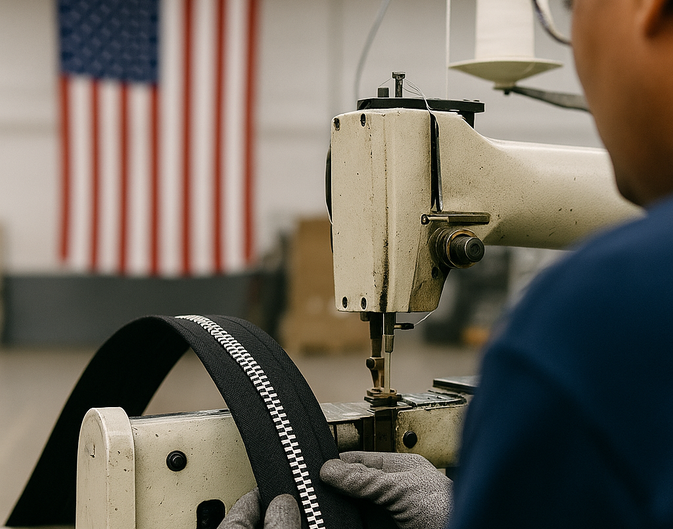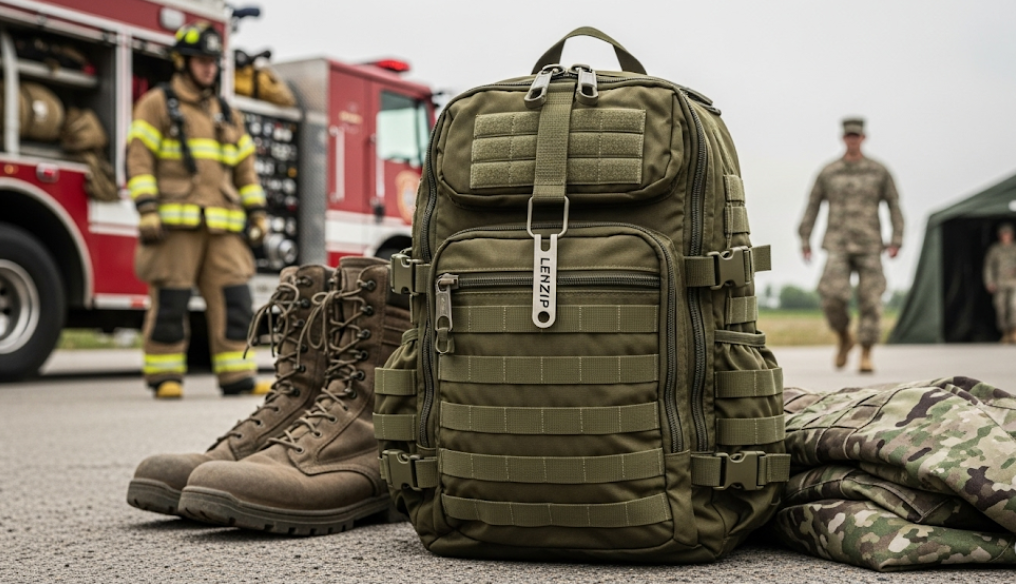When it comes to product performance in harsh and demanding environments, even the toughest fabrics and designs can fail if their closures cannot withstand extreme conditions. Zippers are a deceptively small detail but frequently prove to be the weak point for gear, apparel, shelters, and industrial components operating at the edge of performance.
Whether it’s tactical zippers for combat gear, marine-grade zippers for boat covers, or industrial zippers in welding uniforms, zipper strength and reliability are essential for mission-critical performance. Failures in zipper durability have led to costly repairs, ruined expeditions, and even compromised safety.
That’s why OEMs and industrial buyers must consider not just the outer materials, but the closures themselves. Partnering with a specialized supplier like LenZip, a U.S.-owned zipper manufacturer, ensures access to engineered zipper solutions built for extreme environments.
What Defines an Extreme Environment?
Extreme environments push products to their limit — and closures must perform under these punishing conditions. The most common zipper challenges include:
- Heat and Flame: Firefighting gear, welding PPE, and automotive interiors face extreme heat where standard zippers can melt or lose integrity. High-temperature metal zippers, heat-resistant tapes, and flame-retardant zippers are required to pass NFPA Standards.
- Saltwater and Corrosion: Marine-grade applications demand corrosion-resistant zippers and saltwater-resistant zippers for covers, offshore gear, and safety bags. Stainless steel, treated molded tooth zippers, and advanced coatings extend lifecycle.
- Chemical Exposure: Hazmat suit zippers and chemical-resistant zippers in industrial uniforms must withstand acids, solvents, and hazardous compounds. Reinforced coil or molded designs with corrosion-resistant finishes are common.
- Abrasion, Sand, and Dust: Tactical gear zippers must endure desert conditions, mud, and dust. Military-grade zippers and abrasion-resistant zippers with oversized teeth patterns prevent failure.
- Cold and Freezing: Arctic tent zippers and mountaineering jacket zippers require cold weather zippers that remain flexible at subzero temperatures. Nylon coil and polyester zippers with winterized tapes prevent cracking or seizing.
Each of these use cases underscores why a zipper can make or break the performance of protective clothing, outdoor gear, industrial uniforms, or marine enclosures.

Zipper Materials for Harsh Conditions
Selecting the right zipper material is mission-critical. Different types offer unique strengths and weaknesses:
Coil Zippers (Nylon or Polyester): Flexible and lightweight, coil zippers are favored for rugged outdoor gear. The spiral coil teeth prevent jams from grit and sand, making them ideal for tents, ski gear, and tactical packs.
Molded Tooth Zippers: Often used in marine equipment and heavy-duty covers, molded tooth zippers resist corrosion, remain flexible under pressure, and handle exposure to water, UV, and dust.
Metal Zippers (Stainless Steel, Brass, Aluminum): High-quality metal zippers offer unmatched strength. Stainless steel and brass zippers resist corrosion, while specialized platings add chemical protection. They are used in automotive interiors, industrial bags, and heavy-duty tents. Zipper Types Explained breaks down which applications suit each.
Heat-Resistant Tapes & Flame-Retardant Fabrics: Firefighter gear and welding PPE require flame-retardant zippers tested to NFPA Standards. Advanced composites ensure both teeth and tape maintain integrity under fire.
Corrosion-Resistant Coatings: Marine-grade zippers depend on proprietary coatings that resist salt spray and chemical attack, extending lifecycle in offshore and hazmat use.
UV-Resistant Finishes: Prolonged sunlight exposure weakens tapes. UV-resistant zippers are critical for boat covers, tents, and outdoor enclosures.
For OEMs, the right combination of zipper gauge, tape material, and finish can be the difference between reliable performance and costly field failure.
Testing & Standards for Zipper Reliability
In extreme environments, testing and compliance are non-negotiable. Zippers must meet rigorous standards before they can be trusted in mission-critical gear.
- ASTM Zipper Standards: Cover tensile strength, fatigue, abrasion resistance, and corrosion.
- NFPA Standards: Required for fire-resistant zippers in protective gear.
- MIL-SPEC: Military-grade zippers must withstand pull force, corrosion, sand abrasion, and impact.
- Textile Exchange: Adds sustainability assurance for eco-conscious brands.
Common test procedures include:
- Tensile strength testing to measure pull resistance.
- Abrasion and fatigue testing for repeated open/close cycles.
- Salt spray corrosion testing for marine and chemical applications.
- Temperature cycling for hot-to-cold environments.
OEMs who rely on LenZip’s Zipper Testing Standards can ensure their products pass inspection and perform in the field.

Industry Use Cases
Military & Tactical Gear
Combat uniforms, tactical packs, and survival gear require military-grade zippers that resist mud, sand, and combat stress. Reinforced sliders and large gauge zippers deliver operational reliability.
Marine Applications
Marine-grade zippers for boat covers face constant saltwater and UV exposure. Corrosion-proof finishes and UV-resistant tapes are vital for long-term reliability.
Protective Clothing & PPE
Firefighter gear zippers and hazmat suit zippers must withstand flames, chemicals, and daily wear. Compliance with NFPA and ASTM is essential to guarantee worker safety.
Outdoor Gear
Tent zippers, expedition packs, and ski gear zippers require flexibility in freezing conditions and abrasion resistance from dust, ice, and friction.
Automotive & Industrial
Automotive interior zippers and industrial workwear zippers face exposure to grease, solvents, and vibration. Choosing custom heavy-duty zippers reduces failure in high-stress environments.
How LenZip Engineers for Extreme Environments
What sets LenZip apart is its engineering-first approach and U.S.-based manufacturing. OEMs gain a partner that can customize closures for any environment.
- Custom Heavy-Duty Zippers: Tailored for PPE, tents, tool bags, marine covers, tactical packs, and industrial uniforms.
- Material Innovations: Fire-resistant, corrosion-proof, UV-resistant, and abrasion-proof designs.
- Compliance Testing: All products validated against ASTM, NFPA, and MIL-SPEC standards.
- U.S. Manufacturing Advantage: Faster lead times, strict quality control, and responsive engineering support.
Learn more on the Products page or request a quote to discuss custom zipper solutions.
Conclusion & Call to Action
An extreme environment exposes every detail of a product to relentless stress. Weak zippers undermine even the toughest fabrics and designs. For OEMs, engineers, and industrial buyers, specifying the right heavy-duty zippers is as important as choosing the base material itself.
U.S.-manufactured, custom-engineered zippers from LenZip deliver tested durability, compliance, and performance across industries—from military and marine to outdoor, industrial, and protective gear.
Strong products begin with strong closures.
Explore LenZip’s products, learn about zipper types, and request a quote today to see how LenZip zippers perform under the harshest conditions.
FAQ
Q1. What type of zippers are best for extreme conditions?
Heavy-duty molded tooth or metal zippers with corrosion-resistant coatings and reinforced sliders are the most reliable for harsh use.
Q2. Can zippers withstand saltwater exposure?
Yes. Marine-grade zippers with stainless steel or coated molded teeth are engineered to resist salt spray and humidity.
Q3. What standards apply to fire-resistant zippers?
Zippers for protective clothing must comply with NFPA Standards to ensure flame resistance and mechanical strength.
Q4. Do tactical zippers differ from regular zippers?
Yes. Tactical gear zippers are larger gauge, abrasion-resistant, and often tested to MIL-SPEC standards to withstand sand, mud, and combat stress.
Q5. Does LenZip make custom zippers for OEMs?
Absolutely. LenZip specializes in custom-engineered zipper solutions for PPE, industrial uniforms, tactical packs, marine covers, and more.
